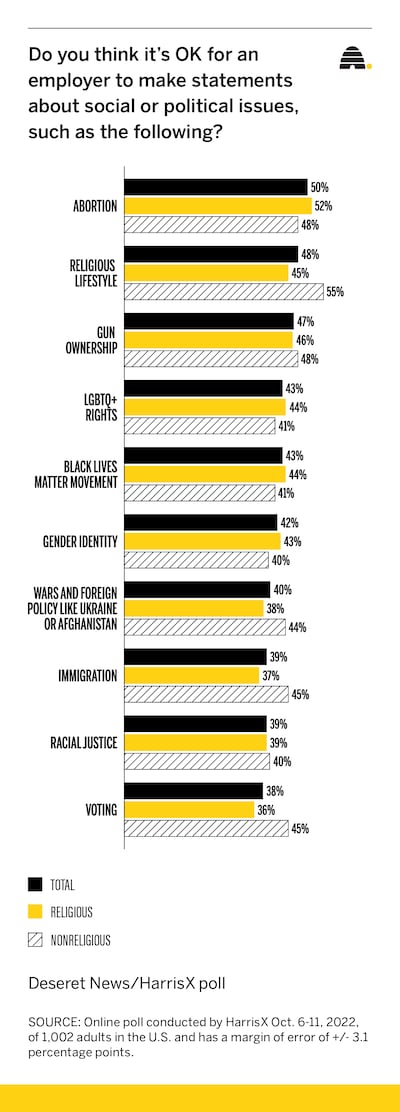When the Supreme Court reversed Roe v. Wade and let the states decide whether or not abortion would be legal, several corporate leaders took it upon themselves to release statements decrying the decision. Among those offering an opinion was Levi Strauss & Co., which released a statement that said “public health issues are workplace issues” and that “business leaders are responsible for protecting the health and well-being of our employees, and that includes protecting reproductive rights and abortion access.”
It is a strange feature of our modern age that many companies have become so political, and that business leaders feel the need to make big public statements about contentious issues. Some conservatives have complained that corporations have gone “woke,” as they typically take progressive stances on issues like abortion and voting laws.
Meanwhile, Americans are understandably weary of the politicization of everything, including their workplaces.

Businesses don’t just risk alienating their customers or politicians when they make political statements; they also risk alienating their own employees who may hold different views, including those whose views may come from deeply held religious beliefs. Business leaders should be concerned that when they bring politics into the workplace, they also invite in the fissures that have appeared in American society in recent years, which could divide their workforces and ultimately hurt productivity.
As it turns out, a majority of employees don’t want their employer to speak out on sensitive social issues, according to a new national poll conducted by HarrisX for the Deseret News. Only 35% of respondents said it was OK for an employer to make a public statement about abortion, while 50% said it was not OK. The split was similar for employers making comments about religion and gun rights.
The poll was conducted online from Oct. 6-11, among 1,002 U.S. adults. The margin of error for the full sample is 3.1 percentage points.
On LGBTQ rights, more Americans said businesses shouldn’t make political statements on the issue than said it was OK to do so, but the split was much closer. On several other contentious social issues — such as support for Black Lives Matter or social justice — respondents were closely divided on whether or not it was OK for businesses to make a public statement.
This split is likely one of the reasons it’s difficult for business leaders to decide when and how to speak up, because they risk alienating one or another segment of their workforce. If the pressure from some employees to speak out is louder than the frustration of the employees who want their employer to stay quiet, business leaders may choose to speak up.
But it also may be that business leaders just think it’s their place to speak out on important issues, whether their employees want them to or not. The survey showed a split between respondents who were business leaders and those who were employees, with business leaders more likely to think it was good to speak out.
The survey over-sampled business decision makers to determine what they thought on a variety of issues.
On abortion, for example, roughly 4 in 10 (42%) business leaders said it was OK for a company to make a statement, compared to 3 in 10 (32%) of non-business leaders. On gender identity issues, 56% of business leaders said it was OK for a business to make a statement, compared to only 38% of non-business leaders.
One other interesting finding was that Generation Z respondents were actually less likely to want an employer to speak out than millennials, who were the most likely to say it was OK for an employer to make a public statement on every issue we asked about. For example, on gender identity, 58% of millennials said it was OK to make a public statement, compared to 47% of Gen Zs, 37% of Generation X respondents and 30% of baby boomers.
It may be that growing up in a politically saturated environment has made Gen Z’ers less likely to want politics in the workplace.
A majority of Americans are more comfortable with employers speaking out on issues that clearly dovetail with a business’s interests — like education, healthcare or taxes. Even on COVID-19, which has been a very contentious issue publicly, 61% of respondents said they thought it was OK for an employer to speak about it publicly.
That makes sense — COVID-19 affected businesses directly. It’s harder to find a connection between a business and voting laws, or a business and the Black Lives Matter movement.
There are many reasons for business leaders to stay out the culture wars, but being able to attract and keep employees with diverse talents and viewpoints may be the one that speaks most closely to their self-interest.


